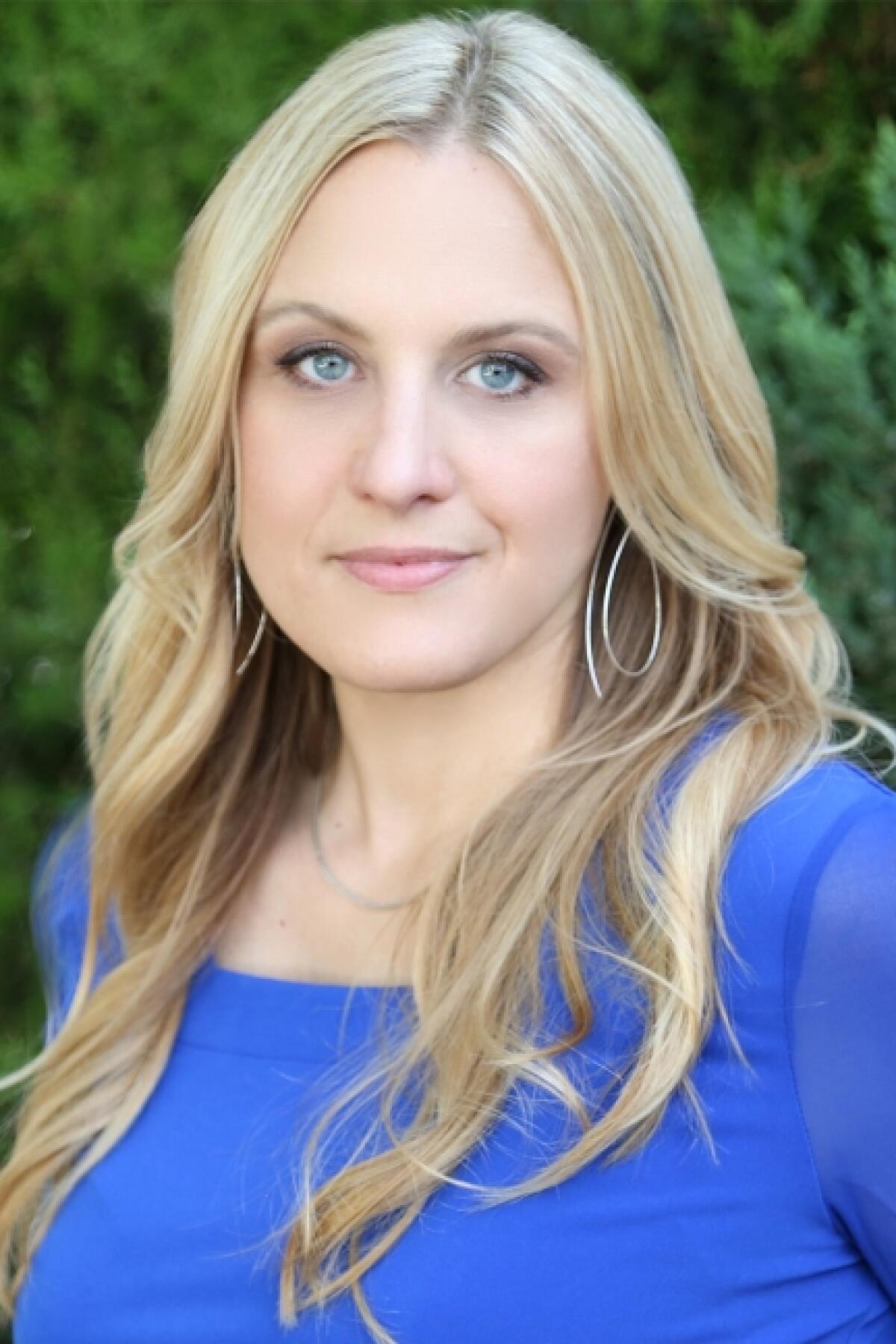In ‘The Exvangelicals,’ Sarah McCammon tells the tale of losing her religion

Book Review
The Exvangelicals: Loving, Living, and Leaving the White Evangelical Church
By Sarah McCammon
St. Martin’s Press: 310 pages, $30
If you buy books linked on our site, The Times may earn a commission from Bookshop.org, whose fees support independent bookstores.
The term “exvangelical,” a reference to disillusioned evangelicals after Donald Trump commandeered 81% of the white evangelical vote in 2016, has always struck me as contrived and a tad too cute. It’s a variation — a reversal, I suppose — of Ronald Reagan’s famous lament that he didn’t leave the Democratic Party; the Democratic Party left him.
In “The Exvangelicals: Loving, Living, and Leaving the White Evangelical Church,” Sarah McCammon defines exvangelicals as individuals who (like her) were reared in evangelicalism but who have come to “deconstruct” their faith because of “their disillusionment with Trumpism, anti-LGBT+ sentiment, racism, religious abuse, skepticism of science, and a host of other concerns about white evangelical beliefs and culture.” Many were either homeschooled or students at Christian schools. Some have left the faith altogether or tried other expressions, such as Catholicism, mainline Protestantism or Orthodox churches; others persist in their efforts to reform evangelicalism.

Although the author, a national political correspondent for NPR, purports to be telling “the stories of millions of Americans,” this book is really autobiography with a few cameo roles. Nevertheless, McCammon’s history is captivating and well told: a childhood cosseted in the evangelical subculture, with schools and sermons trumpeting the Christian nationalism that’s fueling so many culture wars now.
In “The Exvangelicals,” McCammon’s evolution unfolds as a series of steps, chapter by chapter, on a descending staircase toward disillusionment.
She begins by questioning the conviction that only Christians (by which evangelicals mean evangelicals) go to heaven, then rejects creationism and embraces the veracity of science before moving on to such matters as female submission and sexual identities.
“Having a female body came with heavy responsibility and fear,” she writes, referring to admonitions at home and school to dress modestly lest she inflame unholy passions.
Perhaps not surprisingly, McCammon devotes a great deal of attention to her own sexual awakening, much of which occurred at the small evangelical college she attended (which, as it happens, is where I was an undergraduate a couple of decades earlier). The “purity culture” of evangelicalism demanded that women be demure, while young men were cast as warriors and defenders.
“On our wedding night, we didn’t know how to have sex,” one informant tells McCammon, who adds, “That experience is not unusual for young evangelicals who begin their honeymoons with little or no sexual experience, and, often, years of sexual shame.”
Many exvangelicals testify to enduring religious trauma, some of it caused by corporal punishment or perhaps fear of the Rapture, the belief popular among evangelicals that Jesus will return soon to collect the faithful and those “left behind” will face terrible judgment. One psychotherapist cataloged the symptoms of religious trauma as “anxiety and depression, chronic pain and intestinal symptoms, feelings of shame and a tendency toward social isolation.”
Religious trauma drives many evangelicals, including the author and one of her siblings, into therapy and out of evangelicalism, though not necessarily in that order.
McCammon is especially effective at juxtaposing the condemnations of Bill Clinton’s philandering with full-throated defenses of Donald Trump’s sexual predations — the condemnations and the defenses coming from the same evangelical sources with no apparent self-awareness and no hint of irony. Even more devastating is the author’s examination of her Christian school textbooks and recollections of classroom conversations in those schools regarding slavery. One textbook conjured the halcyon days on the plantation — “Southern weather was warm and the slaves stayed healthy” — and a student recalled his teacher’s remark that bondage “was a pretty good gig for them; they got free housing and all their meals were taken care of.”
If historical accuracy and context are missing from these textbooks, however, those qualities are also lacking in McCammon’s narrative, although her missteps are not nearly so egregious. She talks about evangelicalism reaching its peak of influence “beginning in the late 1980s,” ignoring the fact that evangelicals set the nation’s social and political agenda for much of the 19th century, especially in the years before the Civil War, albeit with very different sensibilities.
The author might have explored how white evangelicalism was different before its hard-right turn in defense of racial segregation in the late 1970s. Might an understanding of evangelicalism’s generally laudable social agenda in centuries past — abolition, prison reform, public education, even women’s suffrage were all evangelical concerns — have provided McCammon and her compatriots with a standard to which they could appeal in their quest to reform their churches?
As in many coming-of-age narratives, those who leave the safety of the subculture rarely have smooth landings. McCammon’s marriage to a classmate three months after their college graduation “felt awkward and surprisingly lonely,” she writes; it ended in divorce. The author tells of her parental-enforced estrangement from her grandfather because he was gay. The two mended their relationship and became close during the final years of his life, although McCammon’s overtures to him created a rift with her mother and father.
The author’s schoolmate, Jeff, came out as gay, thereby rupturing the relationship with his parents, who refused to acknowledge his husband at their son’s graduation from seminary. “I am not an evangelical in large part because there’s no room in most of American evangelicalism for queer people,” he told the author. “I’m angry about that. I’m angry and sad for the kids that are still in evangelical churches who are being told they can’t be themselves.”
All these factors and more, together with what many evangelicals regard as the hypocritical embrace of Trump, are leading some evangelicals out of the fold. But leaving itself is traumatic, both for the individuals and for family members left behind.
McCammon quotes a South Dakota exvangelical’s angry letter to Focus on the Family, the organization partially responsible for the subculture veering to the right in the decades surrounding the turn of the 21st century. She cultivated a deep Christian faith outside of evangelicalism. “But thanks to you,” she wrote to the group, “my mother believed I was living a sinful lifestyle because of how I voted.”
“Leaving conservative evangelicalism means giving up the security of silencing some of life’s most vexing and anxiety-inducing questions with a set of ‘answers’ — about the purpose of life, human origins, and what happens after death,” McCammon writes. “It also means losing an entire community of people who could once be relied on to help celebrate weddings and new babies, organize meal trains when you’re sick and bereaved, and provide a built-in network of support and socialization around a shared set of expectations and ideals.”
McCammon insists that the challenge for her and others is to define themselves in positive rather than negative terms — they do not want to be known for what they are fleeing — in which case the label “exvangelical” isn’t exactly helpful. Nonetheless, these “expatriates” are finding safety, or at least comfort, in numbers.
“Many of us who’ve been cast out are surveying the wilderness around us,” she writes, “and finding that we’re anything but alone.”
Randall Balmer teaches religion at Dartmouth College. His most recent book is “Saving Faith: How American Christianity Can Reclaim Its Prophetic Voice.”
More to Read
A cure for the common opinion
Get thought-provoking perspectives with our weekly newsletter.
You may occasionally receive promotional content from the Los Angeles Times.










